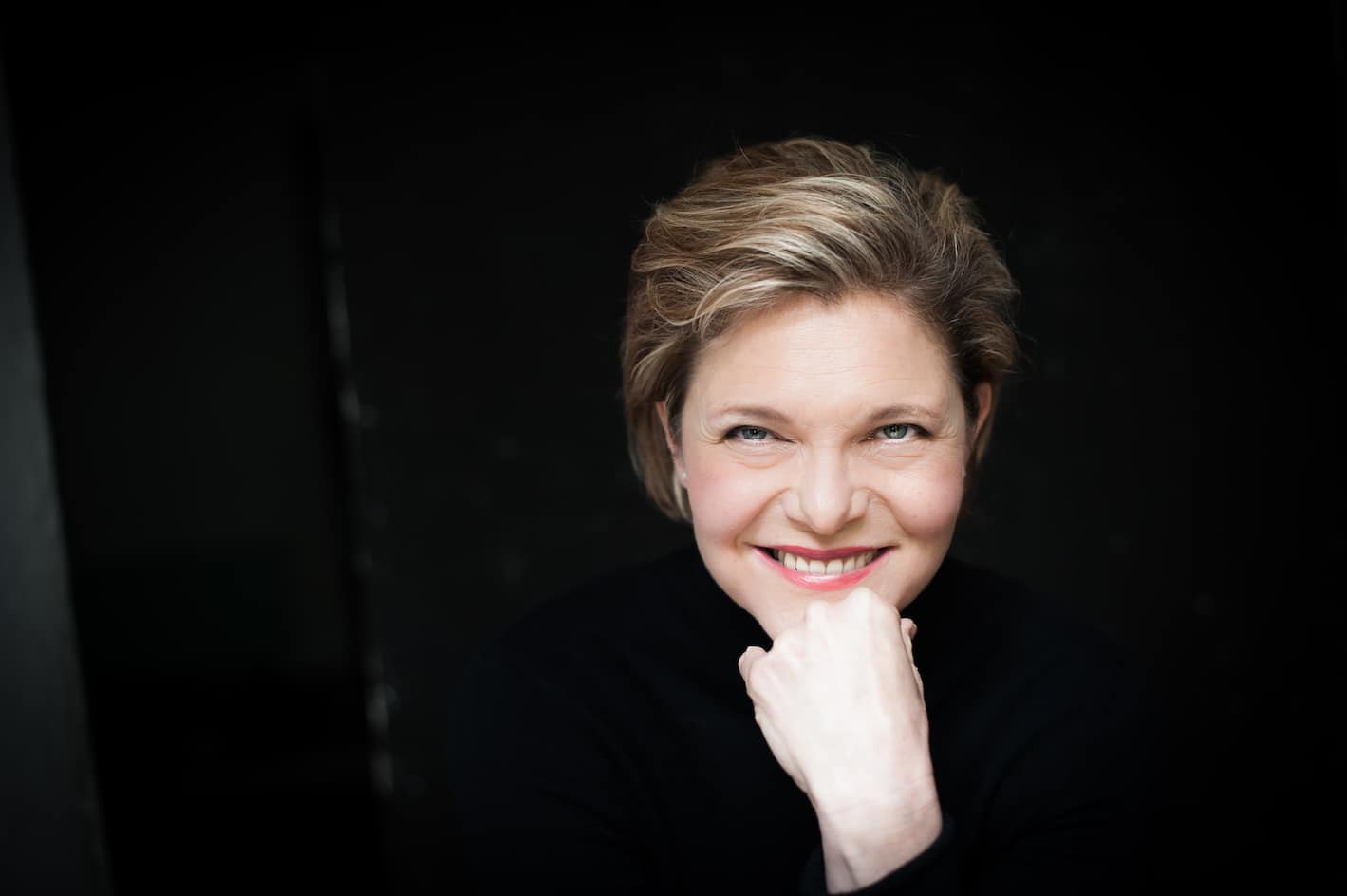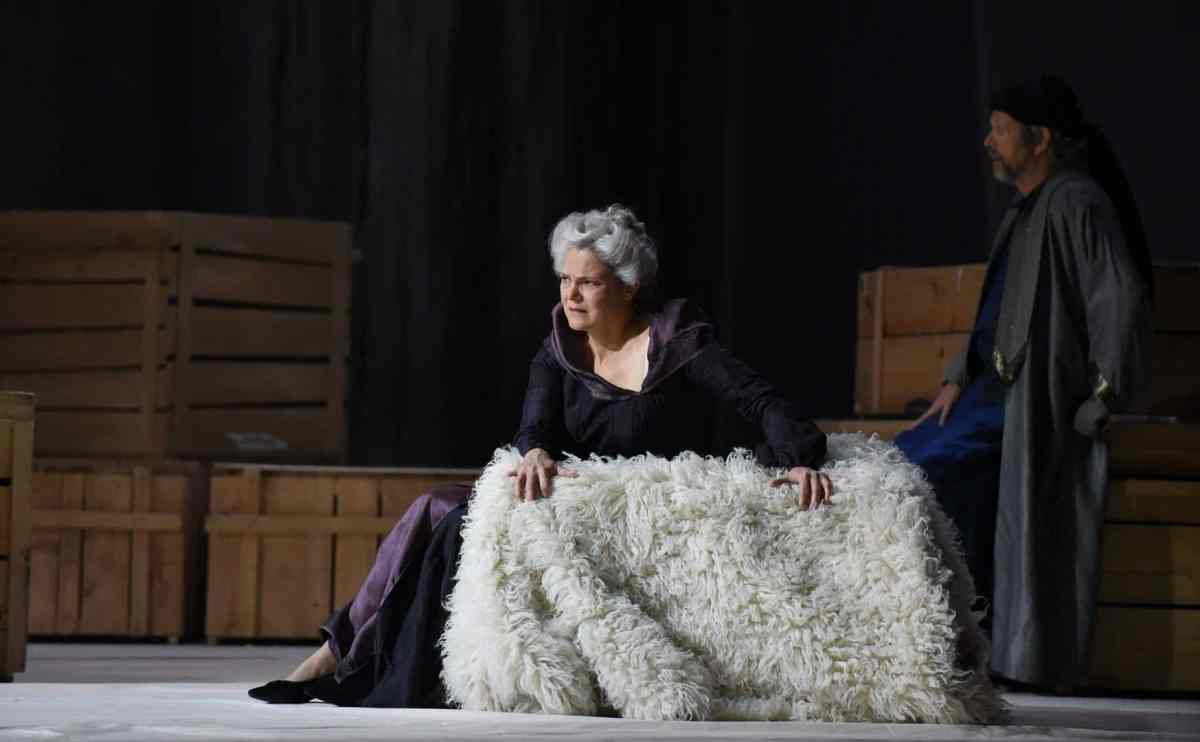“My heart is aghast, / my mind’s in a whirl” sings Fricka, goddess of marriage, hearth, home, and family, faced with her husband Wotan’s latest disruption to their family life. In Richard Wagner’s “Der Ring des Nibelungen,” the queen and king of the gods struggle over how to manage their and other people’s marriages, unruly children, and the delegation of authority. Fricka sings, “Outrageous, laughable lightness! / Cheerful, hardhearted folly! /…. the men though, in scorn / kept away from the women— / without confiding in us— / to talk all alone with the giants…. What can you menfolk / see holy and good / once you’re greedy for power!”
As the German mezzo-soprano Margarete Joswig commented on her website in the fall of 2016, “The big scene with Wotan—the marriage crisis—is a psychological masterpiece.” Joswig was announcing her debut in the role of Fricka at the Staatstheater Wiesbaden, in “Das Rheingold” last November and in “Die Walküre,” opening next week on January 15.
Joswig studied at the Frankfurt University of Music and Performing Arts and, from 1994-2000, was a member of the ensemble of the Saarländisches Staatstheater Saarbrücken. From 2002-2003 she sang at the Staatsoper Stuttgart. Then, for roughly a decade, while raising her three children, she put her career on hold, apart from a few concerts. “One of my most favorite sayings is, ‘You can have everything, but not at the same time,’ ” said Joswig, corresponding in English. “Being a singer for me was just one aspect of my personality. I never said or thought that I couldn’t live without singing or being on stage. Nevertheless, music is essential for my life…but listening to music or making music is possible everywhere and alone.”

After her prolonged absence from the operatic stage, Joswig returned in 2015 and 2016, as the Mother in Humperdinck’s “Hansel and Gretel” and as Fricka, both in Wiesbaden. There’s a special poignancy in contemplating her comeback, not in the roles of tragic maidens, but as mature women, a mother, and a defender of “Halls great and lofty, / warm, household order”—with regard both to Joswig’s artistic trajectory, and also to those of generations of women opera singers.
Operatic depictions of homemakers and mothers span a range of anguished and negative scenarios, from the dead and absent (“Contes d’Hoffmann,” “Carmen”), to the violent (“Faust,” “Jenůfa,” “Elektra”), to the pathetic (“Madama Butterfly”). Yet like Wagner’s psychological portrait of a woman weathering a marital crisis, these characters still manage to be complex, unpredictable—and interesting. Even two of the most notoriously bad moms—the Queen of the Night and Azucena of “Il trovatore”—express a wide range of maternal attitudes. Sometimes, the depiction of maternity is delightfully true-to-life: as musicologist Emily Wilbourne writes, the plot of Francesco Cavalli’s “Il Giasone” hinges on breastfeeding: when Isifile, rushing toward her doom, arranges to breastfeed her twin sons en route, only to get into a protracted fight about public decency with their caregiver, the delay saves her life.
Childrearing for opera singers has been, perhaps, only a little less fraught, from the Medea mythology that enveloped Maria Callas, to the 17th-century Monteverdi-singing mother and daughter Leonida Donati and Silvia Gailarti Manni, who wrangled over Silvia’s potential elopement and alleged pregnancy, then resumed their careers. In 1915, when Alma Gluck, a protegée of Geraldine Farrar, canceled her contracts to have a baby, The Washington Herald exalted her decision while gleefully calculating the cost, in lost income, of each lullaby she’d sing.
In a 1922 article, “Can a Woman Run a Home and a Job, Too?” published by The Literary Digest, opera singers revealed that, whether they’d tried to combine work and motherhood, or left the stage, their career trajectories were uncannily similar to those of singers a century later. Amelita Galli-Curci, who believed “positively” in having it all, said, “The children might be to a certain extent deprived of the personal supervision and companionship of the mother; but on the other hand, if the career is worthwhile, she would be enabled to surround them with an environment and educational advantages that could not but enhance their chance of success in life.” Emma Calvé, citing the experiences of her friends, mused, “Motherhood and a career—why not?… Of course, one must take for granted favorable circumstances whereby a home atmosphere may be preserved during the enforced absence of the mother.”
Nearly 100 years ago, these singers already acknowledged the need for compromise, exhausting dedication, and a strong support system for working mothers. Marguerita Sylva said, “it is not impossible to have both a home and a career, and do justice to both, but it is difficult, very difficult…. How can the young woman, who has to memorize 15 to 25 operas in three or four languages, be coached in them both musically and histrionically, to take her vocal training, meet people, get the good-will of people, select her dresses, and have her general appearance always ready for constant public exhibition…. How can she come home and be patient, and do justice to her husband, children, her home, her servants, etc., etc. No—!!!” Only at the peak of her career, with the help of a supportive second husband, was she able to “take my youngest child, four years old, on most of my tours, providing a trained nurse for her in every town, and the eldest I leave home with my mother, a nurse, a housekeeper, a husband—you see, a regiment….” She dared not take a break: “And for an established artist to leave the profession, and then try to get in again—??????”

Like most other professions, the opera world is about a century late in addressing Sylva’s concerns about accommodating working mothers. In 2000, Jeanne-Michele Charbonnet told The Advocate, “There are opera companies that have issues about performers becoming mothers…. I certainly have felt like I’ve been fighting for my place again. It’s been a real challenge.” Jennifer Rivera has written, “As an American freelance opera singer, I have no job security, no health insurance, no retirement, no maternity leave, no unemployment…. All those things can easily eat up 50 percent of your fee.” Indeed, an article like “Opera Moms Share Their Work Live Travel Hacks” is an acknowledgment of the vicious cycle, where only those singers who are highly paid, with “regiments” of partners, family, or paid childcare providers, can afford to keep performing.
Opera singing and childbearing also both place extraordinary demands on bodies. Renée Fleming wrote about singing her first Tatyana in “Eugene Onegin,” one month after the birth of her first daughter: “I didn’t have the luxury of time to regain the supportive abdominal strength I needed.…Memorizing an opera in Russian is difficult under the best of circumstances, but now it seemed virtually impossible, since like every other new mother I had given up sleeping through the night. This was the time when I discovered that having an infant and memory are mutually exclusive.” While some singers have enjoyed pregnancy side effects like hormonal changes to their voices and expansion of their ribcages, the physiological changes vary. Isobel Leonard said that during pregnancy, “I didn’t have the air I wanted. I didn’t feel like the support was there.” The legendary Marilyn Horne, who sang up to three weeks before the birth of her daughter, told her, “I remember feeling a leg underneath my rib…. I had problems after the birth with breath support. My voice just kept cracking. I never did feel totally normal until about a year later.” Then there’s the critical pressure, such as the famously misogynist Telegraph review that not only maligned Tara Erraught’s figure, but also backhandedly praised Kate Royal, “who has recently sounded short of her best and stressed by motherhood.”
Many singers who, like Joswig, take extended periods of time off to be with their children also struggle with the loss of opportunities and fear for their voices’ longevity. In Classical Singer, Heather Roberts spoke of her four years off: “Sometimes I wonder where I’d be now in the profession had I not made the choice I had.” Frances Marsh said, “People out there who have been working hard and acquiring gigs and experiences while I’ve been home raising children have gotten ahead in their skills and abilities…. [Keeping up] requires a lot of hard work and a positive attitude.”
Virtually all of these singers spoke of both the difficulties and the joys of juggling their roles, on- and offstage. Margarete Joswig’s debut as Fricka provides yet another way to reassess what a woman singer’s career trajectory should look like, and how she might negotiate motherhood, singing, sacrifice, ambition, delight, and creative strategies—and find her way back to the stage.
Music was always intimately connected to family for Joswig. “I could hear the voices of my parents, my sister and brother in my mother’s belly. In our family, everybody sang. My parents were both elementary school teachers; for them, singing with their pupils every morning was the opening to concentration and fun.… When we children were older and musically trained, instead of saying grace before we had lunch, we sang a four-voiced chorale by Bach.”
She continued, “When I sang my first Wagner role, Flosshilde at the opera house in Stuttgart, I enjoyed it very much. The part is beautiful, especially when singing in harmony with the other two Rhinemaidens. I loved to be the foundation of this trio. I was sure that one day I would change to Fricka, Waltraute, and Erda.”
When asked about the thrills and challenges of her work, and how her early notions of what a singer’s career should be match up with her reality, she said, “From the time of my studies, having a career meant to me being able to work as a soloist and to make my living with this profession, and this approach never changed till today. At the start of my first contract at the opera house of Saarbrücken I struggled. Coming from the contralto repertoire, I was very quickly tired by singing a higher range. After a while, I started to take lessons with a teacher in Saarbrücken. This helped me a lot to get over my problems, and I was even able to sing Rossini roles.” Joswig stayed in Saarbrücken for six seasons, where several roles close to her heart included Hänsel, Orfeo, Idamante, Dorabella, and Oktavian.
But, she said, the “business” aspect of the job wasn’t satisfying. “Every time I wanted to leave the city, I had to ask for permission. I also missed a lot of family events because I was busy. Without earning money with concerts outside of the opera contract, I didn’t have enough to pay for my living, apartment, car, holidays and so on. This was quite disheartening!”
The latest from VAN, delivered straight to your inbox
Asked about the challenges facing women singers who want families, and whether or not she was ever afraid for her voice, she said, “I wanted to have a family, and I recognized very soon how difficult it would be to raise children under the circumstances that influence a singer’s life. Therefore, I decided to work less, and in the end, for nearly 10 years, I didn’t step on an opera stage. I tried to take singing lessons and coaching regularly, so I was able to sing concerts. But mostly for me it felt like a chin-up to do a concert or a recital. But I never gave up, I tried to hold on, even [though] I was exhausted by my daily life. Singers need to sleep, and I had a constant lack of recuperation. Therefore my voice was very tired, too, and sometimes I thought that even talking was too much for me. I planned to go back to business, when the children were older, but it seemed never to happen. There were too many projects I stepped in that weren’t my own ones, and I accepted that my time was eaten up. Caring for others became more important than caring for myself.”
In looking at Joswig’s career, perhaps it’s important not to consider her as having taken a break and made a comeback, but rather as her having made an artistic trajectory, over the lifetime of her voice, that defies linear ideas of what a singer’s career “ought” to be—ideas that may have little to do with many women singer’s realities.

“Recently I read a very good quote: ‘Work has to fit to your life and not the other way around’—admittedly not very easy in this profession,” she said. “In 2014, after a big change in my personal life, I tried to go back on stage, and I succeeded pretty fast, [which] I regard as a great gift. After such a long absence from the opera stage, I am very happy to be able to make acquisitions by myself. I have many contacts in the opera world, and at this point, I have upcoming engagements for the next two years. But—I am not willing to work the whole year round. I want to enjoy life and share it with my children. Being an artist and being able to show your talent is, for sure, one of the most satisfying jobs, but I try not to take it too seriously. I do not look at myself as if what I am doing is soooo important. There must always be a little bit of laughter behind it.”
Preparing for her debut as Fricka reconnected her with the opera community, including her teacher, Margreet Honig, in Amsterdam, and her coaches. “Singing a main role in Wagner’s ‘Ring’ is a dream come true, very challenging but very satisfying too. To meet and to work the other singers, the conductor, the director, to develop the staging and the character, to see how the production grows, how all the things come together in the end…is still fascinating for me.”
Fricka is also a role steeped in ambiguity and suggestiveness about women and family, a role that would be a challenge under any circumstances—not to mention such high stakes as a comeback. Joswig tackled it head-on, just as she had on her website. “The big scene between Fricka and Wotan in the ‘Walküre,’ where she claims for Sigmund’s death, is psychologically very interesting and has a great structure that builds up a lot of tension. In the end, nobody wins. Fricka got her so-called revenge—for me, she just wants to hurt Wotan for his unfaithfulness by seeing Sigmund and, in the end, Sieglinde, dead. She wants to take away from Wotan that which he loves. Wotan is entrapped in his own net and deeply frustrated, and even Brünnhilde, who can read his mind, is not able to avoid Sigmund’s death.
“Wagner’s music is very strong and intoxicating, and I like to find the sense that is behind the words. There are all the facets of human life in the Ring cycle: great humor, foolishness, thwarted plans, deepest love, terrible betrayal, heartbreaking disappointment, as well as the need to relinquish and let go in the end.” ¶
Subscribers keep VAN running!
VAN is proud to be an independent classical music magazine thanks to our subscribers. For just over 10 cents a day, you can enjoy unlimited access to over 875 articles in our archives—and get new ones delivered straight to your inbox each week.
Not ready to commit to a full year?
You can test-drive VAN for one month for the price of a coffee.


Comments are closed.